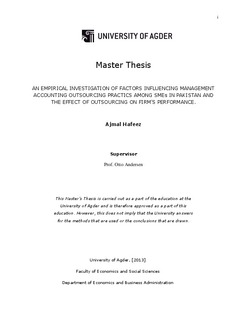| dc.description.abstract | The purpose of this study is to identify factors that affect the Pakistani Small and Medium Enterprises (SMEs) decisions to outsource management accounting practices in terms of transaction cost economics (TCA), the relationship theory (RT), the resource-based view (RBV) and the impact of outsourcing on firm performance. The aim is to investigate the current state of management accounting policies and practices employed in SMEs in Pakistan. Based on the literature review a conceptual model was proposed and fourteen hypotheses were developed. The model examines the effect of several independent variables on management accounting outsourcing and firm performance.
A survey of 302 SMEs was carried out using convenience sampling, a personal interview owners/managers/CFOs located in 9 major cities of Pakistan. Several techniques have been used with the help of Statistical Package for Social Sciences (SPSS) to analyze data, such as factor analysis, Pearson correlation, descriptive statistics and multiple regressions.
The hypothesis was tested for SMEs in the manufacturing sector and the present findings revealed that several factors, including frequency of routine tasks, frequency of non-routine tasks, asset specificity, environmental uncertainty, behavioral uncertainty, opportunism, trust in the accountant, commitment, competition and outsourcing strategy have a significant impact on the management accounting outsourcing. Furthermore, accounting outsourcing has significantly positively associated with firm performance. In addition, the outsourcing mediates the relationship between frequency of routine tasks, frequency of non-routine tasks, opportunism, trust in accountant, commitment, competition and outsourcing strategy with firm performance.
Finally, among the control variables; gender, education and firm size had an insignificant effect on accounting outsourcing whereas experience and firm age were found to have a less significant positive effect on management accounting outsourcing
The result shows that this research might be useful for external accountant or accounting firms to explore the avenues in order to improve service performance. Secondly, it will also help SMEs to identify the resource gap, when and why SMEs refers to the external accountant for outsourcing in order to fill up the resource gap to enhance efficiency and performance. Thirdly, the results of this study will provide information about accounting outsourcing that have a positive association with firm performance for recommendation and benefit to unsuccessful SMEs. Finally, this research contributes to the body of knowledge in the emerging economics context. | no_NO |
